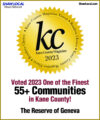Retirement offers a wonderful opportunity to pursue hobbies and interests that you may not have had time for during your working years. One hobby, in particular, that has been on the rise is the study of family history or genealogy. Genealogy is the study and tracing of familial lineages and history. It involves researching and documenting the ancestry and history of one’s family with one goal being to construct a family tree, tracing ancestors back through multiple generations. If you’ve been contemplating studying your own family’s history, here’s a look at the benefits and ways to get started.
Benefits of researching family history.
Researching your family history in retirement can be a deeply rewarding and enriching experience, offering numerous benefits that contribute to personal fulfillment, self-discovery, and connection with loved ones. These include:
- Gain a deeper understanding of your heritage, helping you better understand who you are and where you come from.
- Discover long-lost relatives or ancestors who helped shape your family’s identity and history.
- Spend meaningful time with other family members, including your children and grandchildren, as you research family history together.
- Leave a legacy for future generations by documenting your findings.
Getting started.
1. Begin with what you know.
The hardest part about researching your family history is knowing where to begin. Start by talking to other family members and gathering any old family memorabilia. Look for items such as birth certificates, marriage licenses, diaries, letters, scrapbooks, and old family photographs that can offer valuable insights into your family history.
2. Interview relatives.
Talk to older family members to gather additional information about your heritage. Ask them questions about family traditions, stories, and important memories. Take notes or record the conversation on audio or video to capture information and clues that can assist you in your research.
3. Organize your notes.
As you collect information, determine how to best organize your research materials. A binder or online genealogy website can be great tools for organizing and keeping track of your findings.
4. Utilize online resources.
There are many online resources available to help you access genealogical records. Websites like Ancestry.com and MyHeritage.com provide access to billions of historical records, including census data, immigration records, military records, and more. You can also visit local libraries and historical societies to access resources and records that may not be available online. These institutions often house valuable collections of local newspapers, church records, land deeds, and other historical documents that can provide important information about your family’s past.
5. Get help from professionals.
If you encounter challenges with your research, consider seeking help from professional genealogists or local experts who provide specialized knowledge and expertise in family history. You can also attend local genealogy workshops or classes to learn new research techniques and connect with others who share your interests.
6. Share your discoveries.
It can be a fun and rewarding experience to share your findings with members of your family. Create family history books, albums, or family tree displays to showcase your research and share stories, photos, and documents with loved ones.
Embarking on your genealogy journey is an exciting and rewarding experience that connects you to your past and enriches your understanding of your family’s unique history. At The Reserve of Geneva, our residents have interests that span all types of hobbies and interests. From genealogy and travel to cooking and fitness, when you live in an active adult community, you have the freedom to pursue the passions and people you love the most.
If you’d like to learn more about active adult living in Geneva, IL, contact The Reserve today to set up an in-person tour.



